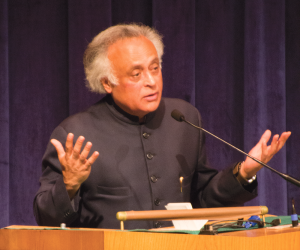
Jairam Ramesh, a member of India’s Parliament and a senior political leader in the Indian National Congress Party, spoke about the need for climate change policy in a lecture hosted by the Georgetown-India Dialogue and the School of Foreign Service Asian Studies Program in the Intercultural Center auditorium on Friday.
Ramesh, who negotiated for India at the 2009 United Nations Climate Change Conference in Copenhagen, spoke about the struggles that policy makers face when trying to find a diplomatic solution to climate change.
“We get it that climate change is here,” Ramesh said. “There are people still in the world who deny the signs of climate change. But my talk is based on the assumption backed by robust scientific evident that climate change is not a hoax, it is not an exaggeration, that global warming is a reality.”
Ramesh, a former minister who held the environment and forests and rural development portfolios, said that this type of climate change is, for the first time, created by humans, instead of natural processes. Despite changes in scientists’ understanding of climate change and increased evidence of its anthropogenic causes, negotiations have remained the same.
“We have yet to discover an economic model that is decoupled from pollution, and economic model that is decoupled from deforestation and an economic model that is decoupled from carbon emissions,” Ramesh said. “The paradox is the world has changed from 1992 but the negotiating framework remains ossified in a world of 1992.”
Ramesh also highlighted the fact that different countries handle climate change in different ways, using the term “common but differentiated responsibilities.”
“It means that we all have common, we are all in this together because climate change is a common responsibility, so it is a common responsibility but it is a differentiated responsibility,” Ramesh said. “What that CBDR is has been left delightfully vague to be interpreted by countries as they chose to see fit.”
Ramesh argued that the problem with this is that different countries have interpreted CBDR in different ways, but said he hopes for a universal solution within the next year.
“In Paris in 2015, it is widely expected that the international community will finally come up with an international agreement, with a global agreement,” Ramesh said. “It would send a clear signal to the world that every country is going to take on some responsibility or the other to do its bit to control global warming.”
Ramesh said that as this conference approaches, policymakers face a “trilemma” between the architecture of the agreement, differentiation between countries and legal implications.
“All three are important,” Ramesh said. “You have to have an agreement that is politically feasible, you have to have an agreement that is economically desirable because you have to have economic growth to generate jobs you can’t do that without economic growth. And you need an agreement that is also environmentally optimal.”
Jeh Tirodkar, a founding member of the Georgetown-India Dialogue, said that the group brought Ramesh to campus due to his background in economics, politics and climate change diplomacy.
“With his knowledge on the issue and the experiences he has at Copenhagen he is one of the foremost authorities on climate change,” Tirodkar wrote in an email to The Hoya. “More importantly, the thought of Mr. Ramesh being the first politician The Georgetown-India Dialogue brought to campus made perfect sense.”
Paul Selling (COL ‘18) said he thought the event was interesting because it explained the United States’ precarious situation in the climate change crisis.
“What particularly interested me was the difficulties with the framework,” Selling said. “Right now, we are based on stock and flow, but the current framework is requiring the United States to have a larger commitment to stopping the fossil fuels while other countries who are contributing to the flow don’t have to do that right now.”














